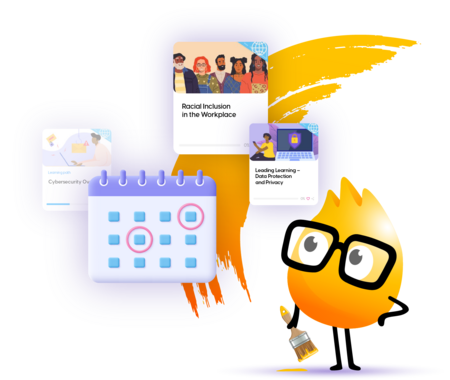5 Ways Mobile Learning Helps You Connect with Your Remote Sales Team
More employees than ever are working remotely. According to Globalworkplaceanalytics.com, the number of employees who work from home has grown by 159% since 2005, more than 11 times faster than the rest of the workforce.
Sales is no exception; FlexJobs’ list of the most popular work-at-home jobs includes sales representatives, business development managers, account managers and executives, and territory sales managers.
Managing a remote sales team has its perks. It saves both organizations and workers money — you don’t have the overhead of a brick and mortar call center and they don’t have to worry about a commute. Remote workers also tend to be happier. According to Gallup, fully-remote workers are more likely to feel heard at work and that they’re doing what they do best every day, while workers who are remote most of the time have the highest levels of employee engagement.
However, remote teams also present unique challenges, like training.
How do you cultivate an atmosphere of continuous learning when your reps aren’t in the same building — or even in the same time zone — with you? How do you provide coaching for reps who aren’t performing well, or help a salesperson correct a pitch that needs just a little more work to be perfect?
The answer to all these questions is in your pocket.
How mobile learning helps remote sales teams
Gone are the days of calling everyone from their desks into a conference room for training. Also gone are the days when all employees — remote or onsite – worked from a desktop or laptops.
More U.S. adults own a smartphone than any other device and you can bet that your remote employees are likely using a smartphone for at least part of their job.
If you want to make sure they’re taking your training, you have to be able to provide learning that can be consumed on their phones.
Mobile learning is important for remote sales teams for several reasons. Here are five critical ones:
- It helps you reach sales reps where they are. When your sales team works from home, they’re not necessarily at their desks all the time. When they’re not actively making calls or taking meetings, they might be anywhere — picking their kids up from school, going to doctors’ appointments, or running errands. That down time – sitting in the waiting room or the school pick-up line, for example, can easily become training time, especially if your learning has been designed to be consumed quickly.
- It helps you offer salespeople the learning they need exactly when they need it. Although you’re probably available to answer your team’s questions via Slack and email, you’re probably not going to be able to answer all questions as quickly as you would if you were in the same office with your team. Just-in-time learning is training your reps can take exactly when they need it — when they need to know how to handle a certain kind of customer, for example, or if they need a refresher on a product. Mobile learning makes just-in-time learning more powerful because they can take that learning no matter where they are or what they’re doing. It also offers desk-bound reps another screen to learn on. If a salesperson is just about to go into a meeting with a prospective buyer and needs to brush up on handling objections, reviewing a course on her phone while she waits for the Zoom to start can make sure she’s better prepared to close a deal.
- Training helps you manage remote salespeople. On a traditional site-based sales team, the energy is often palpable as reps work toward their targets. Salespeople often feed off each other’s energy and the feedback of their sales manager while they’re cold calling and trying to close. Remote work may make some reps feel adrift; without feedback from their peers, reps may feel as though they’re blindly pushing towards sales targets. New reps might feel like they’re making their own way, unsure of what they’re supposed to do, and if they’re performing well. You can combat these concerns by prescribing a customized learning pathway in your LMS. Offering specific courses to each rep, based on their performance will give your team some direction and some much-needed feedback.
- Mobile training helps your sales team to remember to take training. Do you know how often you check your mobile phone? According to Deloitte, Americans check their phones an average of 52 times a day. Your workers are likely no exception; Deloitte also found that 59% of workers often use their smartphones during work hours. In some workplaces, this might be seen as a negative, but when you’re managing a remote workforce, that screen time becomes a positive. Why? Because you can use the notifications on your reps’ phones to remind them about the training they need to take.
- Training can help you coach remote employees. One of the biggest downsides of a remote sales team is the lack of face time; you don’t get to see your employees in person, and unless you video conference regularly, you might not even be able to put a face to their names. But now, thanks to video assessments in online learning, you can coach your remote salespeople as you would an in-house employee. Video assessments require a learner to upload a video of themselves doing an activity – giving a pitch, for example. The manager then reviews the video and offers feedback, allowing them to offer guidance remotely. Uniquely, Litmos Training includes AI capabilities that automatically score the video based on keywords, filler words like um or ah, pace of speech, and other factors.
Training connects you with your remote sales team
Research suggests that most remote workers enjoy working from home, but there is one thing remote teams miss out on — meaningful connections and conversations with co-workers and managers.
Gallup finds that although productivity rates are high, engagement rates are low among fully remote workers while Buffer’s State of Remote Work 2019 survey found that 19% of remote workers struggle with loneliness.
It’s not just the water cooler chats remote workers miss. They miss coaching from their bosses, being able to lean over a cubicle and ask for help, and feedback on their job performance. For salespeople, who work in a high-stress, high-turnover job, this sense of connection is particularly important.
Training can provide the connection and the sense of direction remote salespeople need and set them up for success as they work toward their quarterly sales goals.






